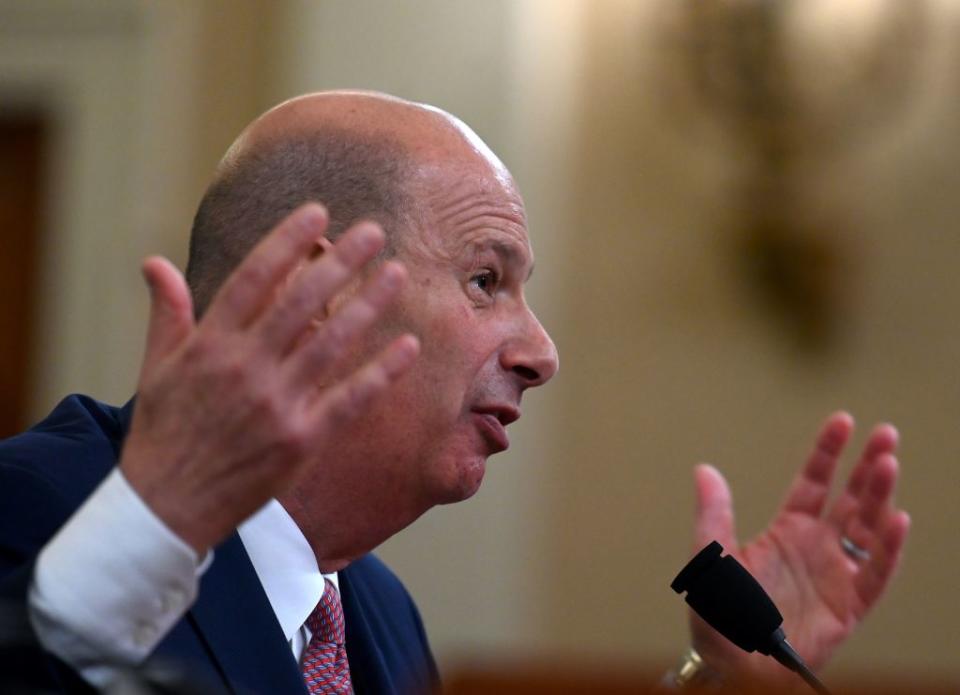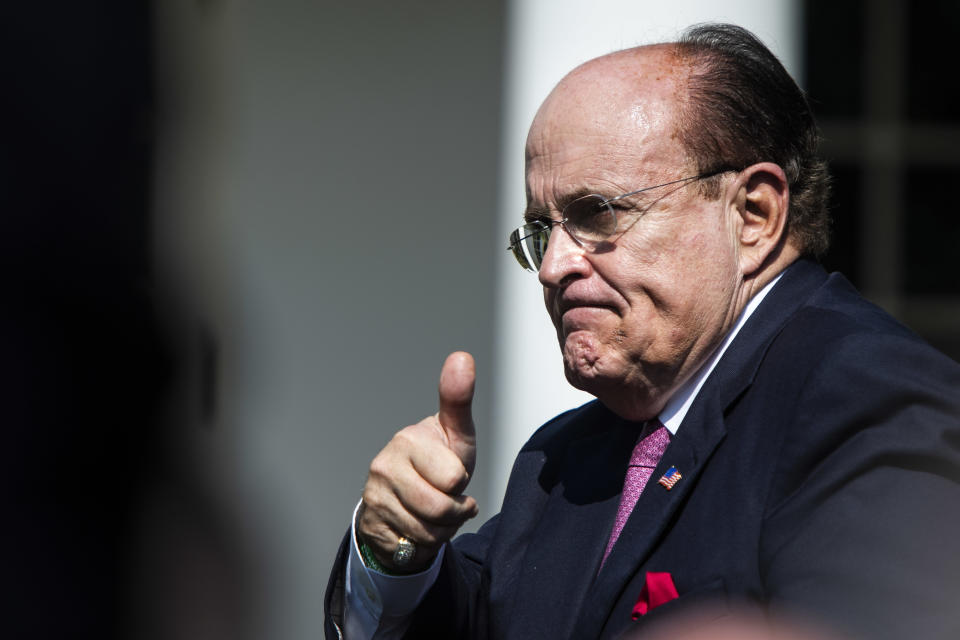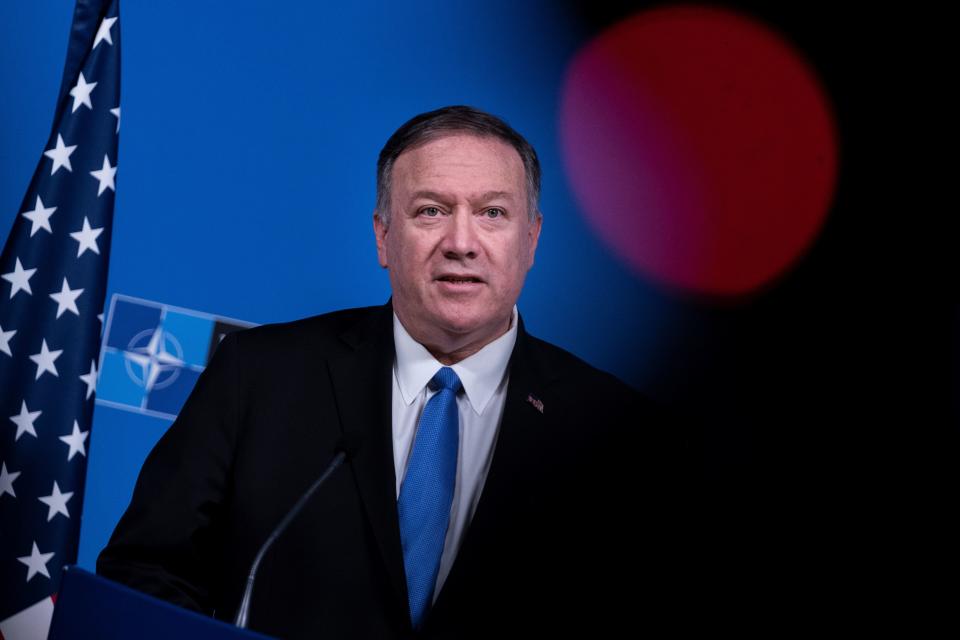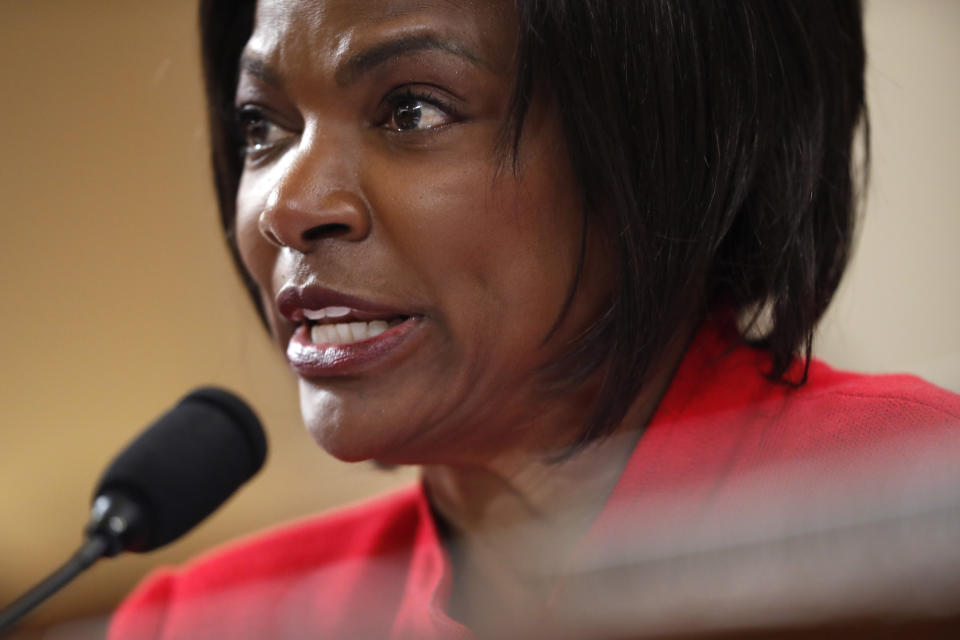Sondland testimony reveals no smoking gun, but no vindication of Trump in impeachment hearing
- Oops!Something went wrong.Please try again later.
WASHINGTON — The morning began badly for President Trump, as his ambassador to the European Union, Gordon Sondland, delivered an opening statement to the House Intelligence Committee that raised and answered the question of whether there was a quid pro quo in the administration’s demands for the Ukrainian government to announce an investigation that would benefit the president politically.
“The answer is yes,” Sondland declared.
But even if that damning opening statement set the tone on cable news and social media, much of the rest of Sondland’s testimony was ambiguous with respect to the points Democrats have been hammering relentlessly in the investigation. He agreed, upon questioning by Rep. Elise Stefanik, R-N.Y., that Trump never explicitly told him that military aid to Ukraine would not be released until President Volodymyr Zelensky announced an investigation into former Vice President Joe Biden and his son Hunter over the latter’s business dealings with Ukrainian energy company Burisma.
“I don’t believe I was part of something wrong,” Sondland said later, when Rep. Joaquin Castro, D-Texas, asked about the July 25 phone call between Zelensky and Trump that prompted a whistleblower complaint and kicked off what eventually became the impeachment inquiry.

Sondland was one of the key figures in carrying out Trump’s Ukraine policy. He did so, he said Wednesday, on orders from the president’s personal attorney Rudy Giuliani, the bombastic former mayor of New York City.
Throughout his testimony, Sondland maintained that he took at face value Trump’s purported interest in rooting out corruption in Ukraine as a reason to withhold military aid and postpone a White House meeting sought by Zelensky. He claimed that he only belatedly understood that the real purpose of Giuliani’s demands was to damage Biden, a potential 2020 rival to Trump. That was also the testimony of Kurt Volker, former U.S. special envoy to Ukraine, on Tuesday.
That strained credulity for many observers, as there would have been little other reason for the White House to express such acute interest in an obscure energy company. “This does not pass the smell test,” tweeted David Axelrod, the former top adviser to President Barack Obama.
Sondland also said he was unaware of “any drug deal,” a reference to the infamous description of Giuliani’s work by John Bolton, the national security adviser during most of the period during which the Ukraine affair took place.
Perhaps Sondland’s most damaging testimony was that Trump did not actually want the Ukraine investigations, only a public announcement they were underway. “He [President Zelensky] had to announce the investigations. He didn’t actually have to do them, as I understood it,” Sondland testified. That demonstrated that Trump mainly sought the political damage to his Democratic rivals that investigations would inflict, rather than any genuine effort to root out corruption.

Sondland’s job was made easier by the fact that he wasn’t able to recall details of some key events and by his lack of notes (though he did offer that he remembered the first girl he kissed). The State Department is withholding from investigators — and Sondland himself — whatever records exist. This seemed to frustrate both sides. “You don’t have records,” said the lead Republican attorney for the committee. “You don’t have notes, because you didn’t take notes. You don’t have a lot of recollections. I mean, this is like the trifecta of unreliability, isn’t that true?”
The Democrats’ attorney also chided Sondland on his poor record-keeping, asking him, “You agree people who take contemporaneous notes are more able to remember things than people who don’t?”
For the most part, however, both sides were careful not to alienate Sondland, who has changed his version of events enough times to pose potential trouble for both the president and his detractors — or, possibly, himself. Even Trump, who has lashed out at some witnesses he has perceived as hostile, including Marie Yovanovitch, former U.S. ambassador to Ukraine, and Lt. Col. Alexander Vindman of the National Security Council, who testified Tuesday in his medal-bedecked dress uniform, was relatively restrained about Sondland.
“I don’t know him very well. I have not spoken to him much. This is not a man I know well. He seems like a nice guy, though,” Trump said of Sondland during remarks to members of the press on the South Lawn of the White House. He did not attack Sondland as a “Never Trumper” or a member of a fictitious “deep state” intent on undermining his presidency — a charge that would have been difficult to make, considering that he was named ambassador by Trump himself, on the basis of no diplomatic or government experience but a $1 million donation to the president’s inaugural committee.
Later, White House press secretary Stephanie Grisham sent a statement to the press headlined “Ambassador Sondland Completely Exonerates President Trump of Any Wrongdoing.” That was not the assessment of most neutral observers.
Sondland’s testimony seemed especially damaging to Giuliani, who came off as the enforcer of Trump’s demands on U.S. diplomats, who were expected to convey them to Zelensky. The former U.S. attorney and New York City mayor resorted to the Trumpian tactic of defending himself on Twitter. “Sondland is speculating based on VERY little contact,” he said in one message. “I never met him and had very few calls with him.”
Sondland also seemed to implicate Secretary of State Mike Pompeo. The loyal Trump acolyte, who has political ambitions that are rumored to include a Senate seat in his home state of Kansas, and eventually even the White House, has generally done his best to stay as far away as possible from all aspects of the impeachment inquiry, most notably by declining to defend officials in his own department from Trump’s attacks.
However, that distance may become increasingly difficult to maintain. Sondland depicted Pompeo as aware of and involved in the pressure campaign on Zelensky. Asked at a press conference what he made of Sondland’s testimony, Pompeo shot back sourly at the journalist who posed the question: “I didn’t see a single thing today. I was working. Sounds like you might not have been.”

Republicans kept returning to a Sept. 9 phone call between Sondland and Trump in which Trump told Sondland he wanted Zelensky to “do the right thing” and that he wanted “no quid pro quo.” In his questioning of Sondland, the customarily spirited Rep. Jim Jordan, R-Ohio, one of the president’s most unfailing supporters, asked why Sondland had failed to mention that exculpatory detail in his opening statement.
“You can’t find time to put that in a 23-page opening statement?” Jordan speculated.
It fell to Rep. Val Demings, D-Fla., to later point out that Trump brought up the phrase “quid pro quo” unprompted, in response to a request from Sondland to explain what the president wanted him to do. The implication seemed to be that Trump was eager to get on the record as brooking no impropriety, should the matter become, as it inevitably did, a matter of investigatory interest.
“What prompted him to use that term?” Demings asked.
Sondland stuck to the diffidence that had served him so well throughout most of the day: “I have no clue,” he said.

But Democrats said they had a clue: The phone call took place on the same day that the inspector general of the intelligence community wrote to Congress about a whistleblower complaint over Trump’s pressure on Zelensky. The complaint itself had been filed in August, and the White House appears to have been aware of its contents by the time Trump spoke to Sondland.
Two days later, the hold on military aid to Ukraine was suddenly lifted without explanation.
Republicans maintained, as they have throughout the impeachment inquiry, a no-harm-no-foul attitude. Jordan pointed out that the assistance was paid without the announcement Trump had sought from Zelensky.
“God bless America,” Jordan concluded. “It all worked.”
_____
Download the Yahoo News app to customize your experience.
Read more from Yahoo News:
Rebuilding Paradise: A year after the Camp Fire, one couple finds healing in starting over
Key Democrat: House needs to ‘keep this simple’ in crafting impeachment articles
As Supreme Court weighs DACA, Trump pushes fiction about ‘hardened criminals’
PHOTOS: 10 bronze statues of inspirational women in NYC by Statues for Equality



